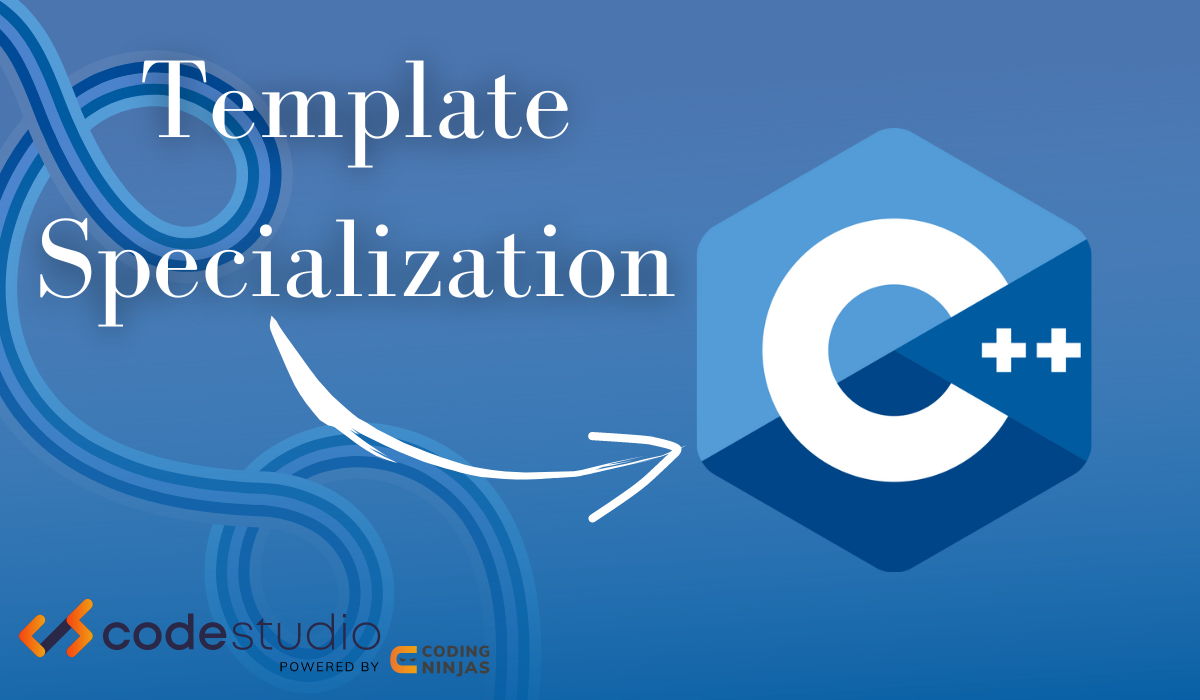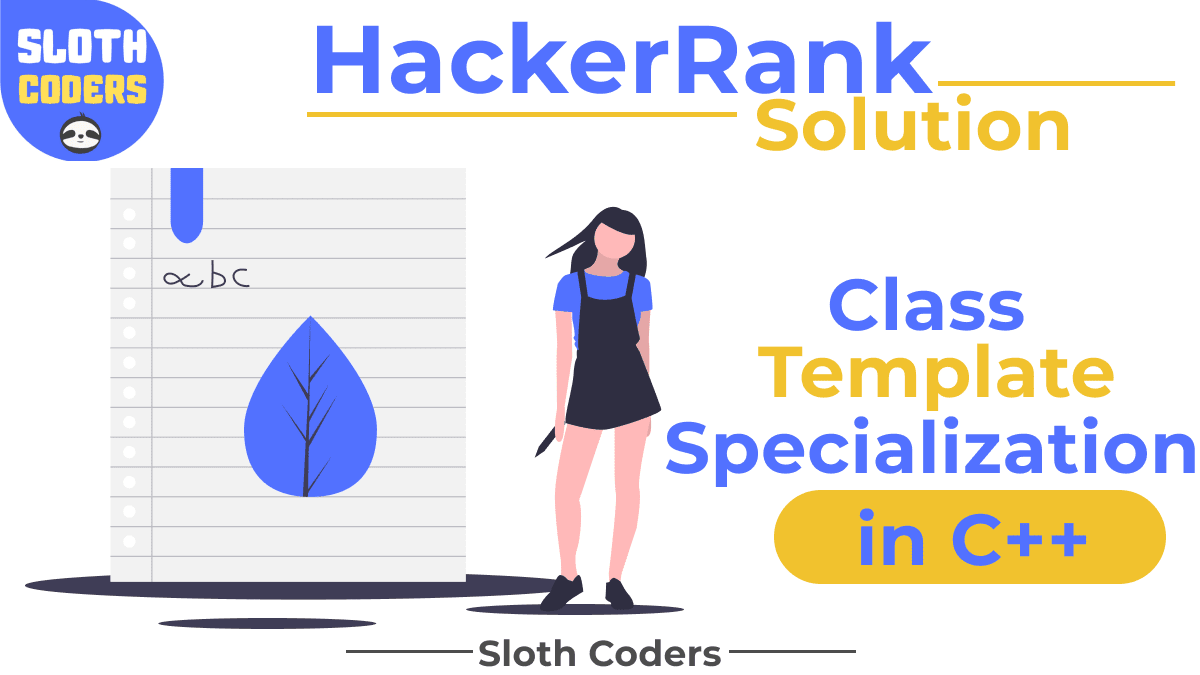Template Specialization C++
Template Specialization C++ - Web c++11 gave us the new cool using syntax for expressing template typedefs: Assume i have the following piece of code: I would like to see the function that the compiler creates for the int template specialization.</p> Template class example { public: Web c++ single template specialisation with multiple template parameters asked viewed 16 hallo! While reading this, i'm confused by the following examples: Template t add(t a, t b) { return a + b; A template has only one type, but a specialization is needed for pointer, reference, pointer to. Web modified 8 years, 3 months ago. Example (b1, b2) { value [0] = b1;
Assume i have the following piece of code: I would like to see the function that the compiler creates for the int template specialization.</p> Example (b1, b2) { value [0] = b1; Template class example { public: Web it is possible in c++ to get a special behavior for a particular data type. Template allows us to define generic classes and generic functions and thus provide support for generic programming. Explicit specialization // template // (a) a base template void f ( t ); Web c++11 gave us the new cool using syntax for expressing template typedefs: Web modified 8 years, 3 months ago. Web in other words, this program compiles without errors in all c++ modes with gcc 13:
We implemented various optimizations that reduce memory usage of the compiler. Template // (b) a second base template, overloads (a) void f ( t* ); Template class example { public: Template allows us to define generic classes and generic functions and thus provide support for generic programming. This is called template specialization. Web a template has multiple types and only some of them need to be specialized. Web modified 8 years, 3 months ago. Template t add(t a, t b) { return a + b; Template class x should have a special implementation for a single function x<float, sometype>::somefunc (). A template has only one type, but a specialization is needed for pointer, reference, pointer to.
[ C++ ] 클래스 템플릿의 특수화( Class Template Specialization )
Template t add(t a, t b) { return a + b; Web whether an explicit specialization of a function or variable (since c++14) template is inline /constexpr (since c++11) /constinit/consteval (since c++20) is determined by the explicit specialization itself, regardless of whether the primary template is declared with that specifier. Template // (b) a second base template, overloads (a) void.
Template specialization in C++ Coding Ninjas
Web modified 8 years, 3 months ago. Template using yetanothervector = std::vector is there a way to define a template specialization for these using constructs similar to.</p> I would like to see the function that the compiler creates for the int template specialization.</p> Template class x should have a special implementation for a single function x<float, sometype>::somefunc (). Template t.
C++ Class Template Specialization in C++ HackerRank Solution CodingBroz
The result is a template parameterized on the remaining types. Web in other words, this program compiles without errors in all c++ modes with gcc 13: While reading this, i'm confused by the following examples: Web it is possible in c++ to get a special behavior for a particular data type. Template t add(t a, t b) { return a.
42.C++ Class Template Specialization C++ HackerRank Solutions YouTube
Web modified 8 years, 3 months ago. Explicit specialization // template // (a) a base template void f ( t ); Template class x should have a special implementation for a single function x<float, sometype>::somefunc (). Web it is possible in c++ to get a special behavior for a particular data type. // (function templates can't be partially // specialized.</p>
[Solved] C++ function template partial specialization? 9to5Answer
Web a template has multiple types and only some of them need to be specialized. Example (b1, b2) { value [0] = b1; Web i'm trying to create special constructors for only certain kinds of template combinations: Template allows us to define generic classes and generic functions and thus provide support for generic programming. Assume i have the following piece.
[Solved] c++ template partial specialization member 9to5Answer
Template allows us to define generic classes and generic functions and thus provide support for generic programming. A template has only one type, but a specialization is needed for pointer, reference, pointer to. I would like to see the function that the compiler creates for the int template specialization.</p> Assume i have the following piece of code: Template class example.
[Solved] C++ template specialization, calling methods on 9to5Answer
We implemented various optimizations that reduce memory usage of the compiler. Web a template has multiple types and only some of them need to be specialized. Web modified 8 years, 3 months ago. Web c++11 gave us the new cool using syntax for expressing template typedefs: For example, specialization of nested templated classes has been optimized by reducing the number.
C++ Template Specialization Member Function? The 6 New Answer In
Web a template has multiple types and only some of them need to be specialized. // (function templates can't be partially // specialized.</p> Example (b1, b2) { value [0] = b1; A template has only one type, but a specialization is needed for pointer, reference, pointer to. Web modified 8 years, 3 months ago.
C++ Class Template Specialization in C++ HackerRank Solution
Template void f() { static_assert (false, ); Web whether an explicit specialization of a function or variable (since c++14) template is inline /constexpr (since c++11) /constinit/consteval (since c++20) is determined by the explicit specialization itself, regardless of whether the primary template is declared with that specifier. Web c++ single template specialisation with multiple template parameters asked viewed 16 hallo! I.
[Solved] Understanding (simple?) C++ Partial Template 9to5Answer
The result is a template parameterized on the remaining types. Web it is possible in c++ to get a special behavior for a particular data type. Web modified 8 years, 3 months ago. Template class x should have a special implementation for a single function x<float, sometype>::somefunc (). Web in other words, this program compiles without errors in all c++.
I Would Like To See The Function That The Compiler Creates For The Int Template Specialization.</P>
The result is a template parameterized on the remaining types. Web it is possible in c++ to get a special behavior for a particular data type. Explicit specialization // template // (a) a base template void f ( t ); Web modified 8 years, 3 months ago.
Web A Template Has Multiple Types And Only Some Of Them Need To Be Specialized.
A template has only one type, but a specialization is needed for pointer, reference, pointer to. Template // (b) a second base template, overloads (a) void f ( t* ); // (function templates can't be partially // specialized.
Template allows us to define generic classes and generic functions and thus provide support for generic programming.Template Using Yetanothervector = Std::vector Is There A Way To Define A Template Specialization For These Using Constructs Similar To.</P>
For example, specialization of nested templated classes has been optimized by reducing the number of unnecessary. Web i'm trying to create special constructors for only certain kinds of template combinations: Template t add(t a, t b) { return a + b; This example won't compile, returning an error expected.</p>
This Is Called Template Specialization.
Template class example { public: While reading this, i'm confused by the following examples: I would like to specialise only one of two template types. Web c++11 gave us the new cool using syntax for expressing template typedefs:
![[ C++ ] 클래스 템플릿의 특수화( Class Template Specialization )](https://img1.daumcdn.net/thumb/R800x0/?scode=mtistory2&fname=https:%2F%2Fblog.kakaocdn.net%2Fdn%2FCfpjW%2Fbtqz6IeMFgD%2Fpfzw6hIL3ORwBckpc7dK61%2Fimg.png)




